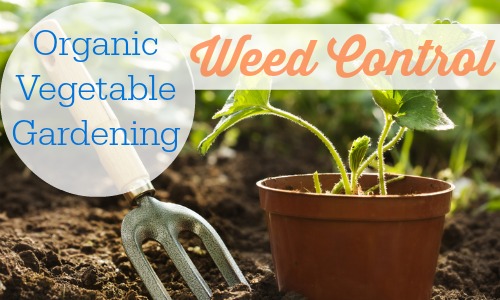This post may contain affiliate links. Read our disclosure here.

Is an organic vegetable garden on your to do list this summer? Here’s why it should be: it is hands down, inarguably, the BEST way to save money on organic produce!
Have you bought organic bell peppers lately? These are a staple in my kitchen and cost about $4-6 per pound (organic), about the same price as ground beef. For produce, that isn’t very budget friendly. Why buy organic? Bell peppers are on the “Dirty Dozen” list, making them one of the top twelve most pesticide-heavy fruits/vegetables available. Bell peppers, it just so happens, are also rather simple to grow at home. Save $5/lb and grow your own!
With about $5 for seeds and maybe a bit more for soil enhancements, you could grow pounds of organic bell peppers. Pick them green for green peppers or let them ripen for sweeter yellow, orange, or red bell peppers.
Recently, we talked about soil quality and choosing the right seed for your garden. Have you started planting? Today, we’re talking about weed control for your organic vegetable garden. You’ve invested money in organic soil enhancements and maybe bought some organic or heirloom seeds to plant. Let’s keep that garden organic and ditch the synthetic weed control options.
I do not have any professional experience in agriculture. Fortunately, you probably have some knowledgeable professionals at your garden center or local gardening club. They may help troubleshoot your specific questions. As for me, I’m going to focus on some DIY weed control methods that will be 100% safe for your organic garden.
Why Kill Weeds?
You’re growing vegetables, not competing for cover of Better Homes and Gardens, but weed control should still be a priority. Aesthetics aside, weeds can affect your garden. Your soil contains a finite amount of nutrients and holds water, and your garden gets a certain amount of sun. The plants in your garden will have to compete against weeds for these resources. Remove the weeds; remove the competition. Getting rid of weeds (or preventing them) will give your vegetables the best possible environment in which to thrive.
Weed-Killing Options
Keeping weeds out of your garden doesn’t have to be a time-consuming, back-breaking task. Try these three DIY methods for protecting your veggies from weeds.
-
Prevention: Plant in raised beds or containers. By starting with a clean slate, the only weeds that can settle will be on the surface. A quick pluck will remove them in a flash before they have a chance to develop a root structure. Bonus: you don’t have to worry about run-off contamination from other synthetically-treated areas of your lawn (or your neighbor’s lawn), guaranteeing a truly organic vegetable garden.
-
Pre-Emergent: This treatment will prevent weed seeds from sprouting. The good news: pre-emergent is effective. The bad news: it’s too effective and may prevent desirable seeds from sprouting as well. Only use pre-emergent after your garden plants have sprouted and established themselves (details below).
-
Kill ‘Em: If you can’t prevent the weed from growing, you’ll have to kill it. You can do this by pulling it, or you can use a weed killer. The good news: pulling weeds only costs time, and you probably already have a very powerful weed killer in your kitchen pantry. The bad news: weed killers may also kill your vegetable plants. Careful application is required to protect desirable plants (details below).
Preventing Weeds with a Raised Bed
Get that garden off the ground with a raised bed. You can easily build your own raised bed with some untreated lumber, or buy an easily-assembled raised bed kit at the garden center. I found one at my local Home Depot for about $36.
Pre-Emergent Weed Control with Corn Gluten Meal
A pre-emergent weed treatment will prevent any weed seeds from growing. Unfortunately, it may also prevent any seeds from growing, including your fruit/vegetable seeds. For this reason, only use a pre-emergent after your fruit/vegetable seeds have become established.
I looked at the “organic” pre-emergent options at my garden store and found one key ingredient in common: corn gluten meal (CGM). This by-product of the corn industry works by inhibiting root expansion, thereby starving the weed (or any other plant it can affect). As a nice perk, CGM also works as a fertilizer by adding nitrogen to the soil. You can find CGM products, like Concern Weed Prevention Plus ($12 for a 5-lb bag), at your local garden store. However, for the best price, buy corn gluten meal in bulk. I found a 50-lb bag of corn gluten meal for $46 on Amazon.com.
What are you going to do with 50-lbs of corn gluten meal? Besides controlling weeds in your vegetable garden, it can also be used for lawn weeds! It won’t work as effectively as the chemical herbicides, but it is a good, all-natural alternative. You’ll have to apply CGM three to four times per year for a notable difference in your weed population. If you’re interested in using organic care for your lawn, I found lots of resources online. Check out safelawns.org for information on treating your own lawn or for a list of organic lawn professionals in your area.
Weed Killer in Your Kitchen Pantry
If weeds have already wandered into your garden, you have two options: pull them or kill them. Chemical herbicides (like Roundup) will efficiently kill weeds, but they will also add some harmful toxins to your garden. Since you plan on eating this garden, let’s avoid the toxins and use a powerful weed killer that is also safe for food. Do you have a bottle of white vinegar on hand? If so, you are armed to kill some weeds!
The acetic acid in vinegar draws all the moisture out of leaves, cutting off the weed’s source of sunlight and gas exchange. Within a few hours of application, the weed will begin wilting, and the leaves will be completely dried out in a day or two. Vinegar will only affect what it touches. If it doesn’t reach the root, it will not kill the root. Without the leaves, many weeds will die off anyways, but older weeds may bounce back.
Vinegar will work most effectively when combined with a couple days of sunshine. Apply vinegar when you know rain won’t wash it away.
Vinegar’s Limitations
Leaves with a heavy waxy or furry coating will protect the plant against vinegar. In these cases, tweak your weed killing recipe by making a vinegar/soap solution with up to 20% biodegradable soap. The soap will help wash away the plant’s waxes, and it will break the surface tension of water, allowing the vinegar to stick to the leaves. There are dozens of vinegar-based homemade weed killer recipes. I’ve seen a few popping up in my Facebook feed recently. You can add various essential oils and other ingredients to create custom weed killer. Have you tried any of these recipes? Share yours and your results in the comments below.
Vinegar Warning
This household weed-killing solution is non-selective. It will affect any and all leaves the same way, including your vegetables. Apply carefully! You can buy a lawn sprayer for under $10 but use cautiously around desirable plants. If you want to be extra careful, put your vinegar solution in a bucket and use a sponge to apply the weed killer directly to the targeted leaves.
Weed Pulling 101
Have some tough weeds to pull? Dandelions, for example, are so notoriously difficult to pull that there are garden gadgets designed just for them! For almost $60 you can buy a dandelion weed puller. Skip the pricey tool and grab an old knife (or buy a garden knife, $10) to slide along the dandelion’s long, tough, tap root. Wiggle it a bit to loosen the soil and the roots. Then pull the dandelion with a firm grip around the base of the weed. Get a little help from Mother Nature and wait until after a heavy rain to do some weed pulling. The damp soil is more conducive to pulling out weeds.
Perspective
Weeds aren’t inherently bad. Usually, they’re simply good plants that are growing in the wrong place. Unless you’re dealing with nut grass, which will actually harm other plants around it, weeds will not actively hurt your garden. They will, however, consume nutrients and resources that your vegetable plants need. Removing weeds will eliminate competition.
Killing and removing weeds after they’ve started growing will be more laborious and time-consuming than weed prevention. If you can plan ahead, planting in a raised bed or container will significantly reduce your weeding hours and save you lots of backache. If weeds have already established themselves in your garden, start yanking! Grab weeds before they get too comfortable; they’ll be easier to pull. To kill a large section of weeds, use vinegar, being extra careful to only apply it to plants you want to kill.
Next Week…
We’re wrapping up the organic gardening series with a look at DIY organic pest control methods. Are all insects bad news? How can you fight bugs without exposing your organic vegetable garden to synthetic pest control options?
This is part of an Organic Living Journey Guest Post Series now written by Mariana who has a mother’s heart and scientist’s brain.


